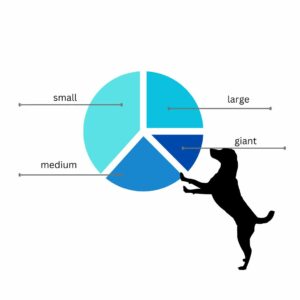I have been in your skin; ” senior dog won’t eat – start panicking”; and I know you are worried, but don’t lose hope yet if your senior pup is not eating.
When I got my dog, my veterinarian imparted a crucial piece of advice that has remained ingrained in my mind for the past 14 years.
“If she is eating and playing, that’s perfect. If she is playing but not eating, pay attention. And if she is not eating and not playing, come and see me.”
These words of wisdom have served as my first instinct when it comes to my dog’s well-being.
In this article, we will delve into potential causes of a dog not eating, discuss recommended actions, and explore effective approaches to resolving this issue.
Senior Dog Won’t Eat: Table of Contents
Older dog won’t eat: things to consider first

First, let’s assess the situation.
If your senior dog is not eating, ask yourself these questions first:
- How long has it been since the last meal?
The frequency of meals for senior dogs can depend on their individual needs, but generally speaking, it is recommended that senior dogs should have smaller, more frequent meals throughout the day rather than one or two larger meals.
Most senior dogs benefit from being fed twice a day, but some may require three or four smaller meals if they have difficulty digesting larger meals or if they have health conditions that affect their appetite or metabolism.
If your senior dog hasn’t eaten in the past 24 hours, especially if there are other symptoms such as lethargy or pain, it is time to go to the vet.
- Have there been any medical procedures or new medications that could affect the appetite?
Medications and medical procedures can have a significant impact on a senior dog’s appetite. Some medications may cause side effects such as nausea, vomiting, or diarrhea, which can reduce a dog’s desire to eat.
Pain medications or treatments for chronic conditions such as arthritis can also affect a dog’s appetite by causing discomfort or lethargy.
On the other hand, some medical procedures such as surgery or dental cleanings may require a dog to fast for a certain period of time before and after the procedure. This can cause temporary changes in appetite and food intake.
In some cases, medications or medical procedures may be necessary to treat underlying health conditions that can affect a senior dog’s appetite, such as kidney disease or cancer.
- Is the senior dog lethargic?
Lethargy in combination with food refusal can mean many things. Most serious health issues, unfortunately, start like this.
There is always a chance that lethargy can be caused by environmental changes and pains that come with older age, but a vet checkup should give you personalized answers.
- Have you changed their diet recently or switched to wet or dry food?
The cause for appetite loss can also be something as simple as your dog doesn’t like the food. If you made changes, or if your dog stated the prescribed diet, chances are they are not going to love it. If this is the case, give them some time to adjust, and perhaps try hand feeding.
- Were there any changes in the environment?
As dogs age, they become more sensitive to changes in their surroundings, alterations in their routine, environment, or daily schedule can trigger stress or anxiety, leading to loss of appetite.
Here are some ways in which environmental changes can cause senior dogs to stop eating:
Moving to a new home: Moving to a new house or a new environment can lead to a loss of appetite due to unfamiliar surroundings, sounds, and smells.
Changes in routine: Any changes in the daily routine of senior dogs, such as a change in feeding times or a change in the location of their food and water bowls, can disrupt their eating habits and cause a loss of appetite.
Changes in the household: Senior dogs may feel stressed or anxious due to changes in their household, such as the arrival of a new family member or a new pet. These changes can disrupt the dog’s routine and cause them to lose their appetite.
If any of these apply to your senior dog’s loss of appetite, and especially if this is a recent issue, please make sure to mention them when visiting the vet.
When Should I Worry About My Dog Not Eating?

I believe you already are.
I will try and give you extensive answers to questions you may have about your senior dog not eating, but only a veterinarian checkup can give you exact answers.
So, when should you be worried?
- If your dog has medical issues and suddenly stopped eating.
- If you notice other symptoms, cough, vomiting, diarrhea, fever, lethargy, shivers, etc.
- If appetite loss is caused by medication, especially if it’s been over 24h.
- If you noticed increased water consumption.
- If you noticed changes in behavior, tripping over steps, or sensitivity in specific body parts.
- If you notice anything out of the ordinary that can’t be explained by recent actions.
Serious medical conditions that can cause appetite loss in senior dogs

Any of the senior dog health issues could be the reason for loss of appetite, but in practice, there are a few that are most common and are first checked by vets:
1. Dental issues
Bad breath, difficulty chewing, and pawing at the mouth are symptoms of dental issues that may include periodontal disease, fractured or broken teeth, and oral tumors.
When a senior dog is experiencing dental issues, they may have pain or discomfort while eating, which can lead to a decreased appetite. Additionally, dental issues can cause infections, which can also affect the dog’s appetite.
2. Digestive problems
The digestive system of senior dogs may become less efficient due to age-related changes or underlying health conditions, such as gastrointestinal infections or inflammatory bowel disease.
When a senior dog is experiencing digestive problems, they may experience symptoms such as vomiting, diarrhea, or constipation, which can decrease their appetite.
Underlying health conditions affecting the digestive system can cause abdominal pain and discomfort, leading to a loss of appetite.
3. Kidney disease
Kidney disease can affect the dog’s gastrointestinal tract, causing nausea and vomiting, which can lead to decreased appetite, affect the dog’s metabolic rate and lead to weight loss or anorexia.
4. Liver disease
Some common liver diseases that may affect senior dogs include hepatitis, cirrhosis, and liver cancer.
When a senior dog is experiencing liver disease, their liver may not be able to function properly, which can cause toxins to build up in their body and affect their appetite.
Liver disease can cause nausea, vomiting, and abdominal discomfort, which can further decrease the dog’s appetite.
5. Cancer
The cancerous growth can affect the dog’s gastrointestinal tract or cause pain, which can lead to decreased appetite. Cancer can affect the dog’s metabolic rate and lead to weight loss or anorexia.
6. Cognitive decline
When a senior dog is experiencing cognitive decline, it may become disoriented, forgetful, and confused. This can cause changes in their eating habits, such as a decrease in appetite, forgetting to eat, or becoming easily distracted during meal times.
7. Heart problems
A dog’s heart may not be able to pump blood effectively, causing fluid buildup in the lungs, abdomen, and other tissues such as cardiac arrhythmia (irregular heartbeat), and canine dilated cardiomyopathy (DCM). This can lead to a decrease in appetite and energy levels, as well as coughing, difficulty breathing, and fatigue.
8. Hypoglycemia
When a senior dog is experiencing hypoglycemia, their body is not able to regulate blood sugar levels properly, which can lead to a decreased appetite. Additionally, low blood sugar can cause weakness and lethargy, which can make it difficult for the dog to eat or drink.
9. Addison’s disease
Also known as hypoadrenocorticism, is a condition in which the adrenal glands do not produce enough hormones, leading to a variety of symptoms including lethargy, weakness, vomiting, diarrhea, and loss of appetite.
When a senior dog is experiencing Addison’s disease, they may have a decreased appetite due to the hormonal imbalances that occur and vomiting and diarrhea associated with Addison’s disease.
10. Pancreatitis
Pancreatitis is a condition in which the pancreas becomes inflamed, which can cause symptoms such as abdominal pain, vomiting, diarrhea, and loss of appetite in senior dogs. Pancreatitis can be acute or chronic and can be caused by a variety of factors, including diet, obesity, and certain medications.
When a senior dog is experiencing pancreatitis, they may have a decreased appetite due to the abdominal pain and discomfort associated with the condition.
All of the common health issues need to be addressed by the veterinarian.
What to do when your elderly stops eating?

- Schedule a vet visit: This will give you the exact cause and suggested treatments.
- Change the food: Senior dog foods for balanced health, home-cooked food, ingredients, and specific regimens for your dog’s needs can help increase appetite.
- Warm up the food: Warm food can feel more appealing and it can help warm up the stomach if there are any digestive issues.
- Cuddle and comfort your dog: try some of the essential care tips and try hand feeding.
- Take a walk: If possible encourage your dog to move physically. If there are any incontinence issues, movement can help with relief.
- Pain management: If you know your dog feels pain try relieving it first.
- Do things they love: Positive and familiar activities can promote hunger.
- Let them rest: Allow your senior dog to sleep as long as they need to, and then try feeding them.
- Wet food: Wet food for senior dogs showed to be the preferred option when treating appetite loss in older dogs.
What NOT to do when your senior dog won’t eat?
Here are a few tips our vets think you should consider:
1. Don’t force feed, especially before taking the dog to your vet. Force-feeding can cause more problems. If there are any bowel obstructions, pains, or kidney issues; force-feeding can worsen overall health
2. Don’t use human medication or any medication without consultation with your vet: unless prescribed, any medication can cause more side effects.
3. Don’t avoid a vet visit for more than two days: the longer you wait the more serious issues can be caused.
Vet Q&A
What can I feed my senior dog who won’t eat?

Assuming that your senior dog has been evaluated by a veterinarian and no underlying medical conditions have been identified, here are some tips on what to feed your senior dog:
- Warm the food: warming the food can help make it more palatable and appealing to your dog. You can do this by microwaving the food for a few seconds or adding some warm water to it.
- Offer wet food: Wet senior dog food can be more appealing to dogs that have trouble chewing or have dental issues. The moisture content in wet food can also help keep your dog hydrated.
- Try different brands/flavors: Your senior dog may have developed a preference for a certain brand or flavor of dog food over time. Experiment with different brands and flavors to find something your dog likes.
- Add some variety: You can add some variety to your dog’s diet by adding some cooked chicken or turkey, boiled eggs, or some low-sodium broth to their food.
- Consider appetite stimulants: If your senior dog is really struggling to eat, you may need to speak to your veterinarian about prescribing an appetite stimulant.
- Try smaller, more frequent meals: Some senior dogs may prefer smaller, more frequent meals rather than larger meals. This can also help with digestion and prevent stomach upset.
What can I feed my senior dog who won’t eat
- High-quality senior dog food: Look for senior dog food that is specially formulated for their age and needs. Choose a high-quality brand with high protein and nutrient content, and avoid brands that contain fillers, artificial preservatives, and by-products.
- Canned food: Canned food can be a great option for senior dogs who have difficulty chewing or have dental issues. It is typically more palatable than dry food and has a higher moisture content, which can help keep your dog hydrated.
- Home-cooked meals: If your senior dog is a picky eater, you can try making homemade meals for them. This can include cooked chicken or turkey, lean beef, vegetables like green beans and carrots, and rice or other grains. Avoid using seasonings, spices, or fatty foods.
- Bone broth: Bone broth is a nutrient-rich liquid that can be added to your dog’s food or given to them as a standalone meal. It contains collagen, amino acids, and minerals that can support your dog’s health and improve their appetite.
- Wet food topper: If your senior dog doesn’t like the taste of their dry food, you can add a wet food topper to make it more appealing. Simply add a spoonful of canned food on top of their dry food to entice them to eat.
It’s important to introduce new foods slowly and in small quantities to prevent stomach upset or digestive issues. If your senior dog continues to refuse food or has other symptoms, such as vomiting or diarrhea, contact your veterinarian for advice.
How Can I Stimulate My Older Dog’s Appetite?
In addition to the already mentioned tips, and assuming that the vet hasn’t prescribed a specific diet you can also:
Offer dog treats: Offer your dog healthy treats like low-fat cheese or small pieces of cooked meat as a way to stimulate their appetite.
Make sure they are getting enough exercise: Exercise can help stimulate your dog’s appetite. Take them for regular walks or play with them in the yard to encourage them to eat.
Don’t forget to monitor your dog’s weight and overall health when making any changes to their diet.
If your dog continues to refuse food or has other symptoms, such as vomiting or diarrhea, contact your veterinarian for advice.
What can I make for my elderly dog to eat?
There are many homemade meals you can make for your elderly dog that can provide them with the nutrition they need to stay healthy.
When making homemade meals for your dog, it’s important to ensure that the food is balanced and includes nutrients such as proteins, omega-3 fatty acids, vitamins, carbohydrates, and fiber.
Here are some ideas for homemade meals for your elderly dog:
Chicken and Rice :
Boil boneless, skinless chicken and brown rice in separate pots. Once cooked, mix the chicken and rice together in a ratio of 1:1 or 2:1, depending on your dog’s preferences. You can also add some steamed vegetables like green beans, carrots or peas.
Ground Turkey and Quinoa:
Cook ground turkey and quinoa in separate pots. Mix them together in a ratio of 1:1 or 2:1, depending on your dog’s preferences. You can also add some steamed vegetables like sweet potato, broccoli or spinach.
Beef Stew:
Cook stew meat with a small amount of olive oil in a pot until browned. Add in some low-sodium beef broth, chopped vegetables like carrots, celery, and green beans, and simmer until the meat is tender and the vegetables are soft.
Fish and Sweet Potato:
Bake a piece of salmon or whitefish and serve it with steamed or baked sweet potato. You can also add in some cooked green beans or peas.
Omelette:
Cook eggs in a pan with some low-sodium broth and chopped vegetables like spinach, kale, and broccoli. You can also add some chopped cooked chicken or turkey for extra protein.
How Long Can An Old Dog Go Without Eating?
The amount of time an old dog can go without eating depends on several factors, including their age, overall health, and the reason for their lack of appetite.
In general, healthy dogs can go without food for a few days, but it’s important to monitor them closely and seek veterinary care if they continue to refuse food.
Older dogs may have a decreased appetite due to various health issues, such as dental problems, gastrointestinal issues, liver or kidney disease, or cancer. If an older dog goes without eating for more than 24-48 hours, they can develop serious health complications, such as dehydration, malnutrition, and liver problems.
If your dog has not eaten in more than 24 hours, it’s important to take them to the vet to identify and address the underlying cause of their lack of appetite.
Dogs with certain medical conditions, such as diabetes, may not be able to go as long without eating as healthy dogs. These dogs require regular meals and close monitoring to maintain their health.
Can I Offer My Dog Human Food If They Won’t Eat Their Food?

In general, it’s not recommended to offer your dog human food as an alternative to their regular dog food, especially if they are refusing to eat. This is because human food may not provide the balanced nutrition that dogs need, and can cause digestive problems, obesity, or other health issues.
If your dog is refusing to eat their regular dog food, first rule out any underlying health issues by taking them to the vet.
Once you’ve identified and addressed any medical issues, you can try offering your dog a different brand or flavor of dog food, or adding in some wet food or low-sodium broth to entice them to eat.
If your dog still refuses to eat their regular dog food, you can try offering small amounts of dog-safe human food as a treat or supplement to their regular diet.
Some examples of human foods that are safe for dogs include:
- cooked, boneless chicken or turkey,
- cooked eggs,
- cooked sweet potatoes or carrots, and plain cooked rice.
However, it’s important to avoid feeding your dog any foods that are toxic to dogs, such as chocolate, grapes, onions, garlic, and avocado.
It may be tempting to offer your dog human food as an alternative to their regular food, but we must prioritize their nutritional needs and consult the vet before making any significant changes to their diet.
How to recognize end-of-life loss of appetite in senior dogs
When an older dog’s loss of appetite is followed by hiding, laying down and barely moving, lethargy and drowsiness, unfocused vision, and difficulty moving the head could mean that your dog is in the active end-of-life stage.
Recognizing the end-of-life loss of appetite in senior dogs can be difficult, as it can be a symptom of many different health conditions. However, there are some signs that may indicate that your dog is approaching the end of their life, such as:
Refusing Food: A loss of appetite is common in senior dogs, but if your dog is refusing food for several days or weeks, it may be a sign that their body is starting to shut down.
Weight Loss: If your dog is losing weight rapidly or noticeably, it may be a sign that they are not getting enough nutrition to maintain their health.
Decreased Energy: Senior dogs may have decreased energy levels, but if your dog is becoming increasingly lethargic or unresponsive, it may be a sign that their body is shutting down.
Breathing Difficulties: Difficulty breathing or labored breathing can be a sign of a serious health condition or the end of life.
Loss of Interest: If your dog is no longer interested in their favorite activities or spending time with you, it may be a sign that they are preparing to pass away.
Kidney failure
These symptoms can also be caused by other health conditions, and not necessarily indicative of end-of-life loss of appetite in senior dogs. If you’re concerned about your dog’s health, consult with your veterinarian to determine the underlying cause of their symptoms and develop a plan for their care.
Conclusion
Loss of appetite is a common issue for senior dogs, and it can be caused by a variety of underlying health conditions.
It’s important to identify the underlying cause of the loss of appetite and seek veterinary care as soon as possible. Depending on the cause, treatment options may include medication, diet changes, or supportive care.
We mentioned several home remedies and strategies that you can use to stimulate your senior dog’s appetite, such as offering small, frequent meals, providing a comfortable and stress-free environment, and incorporating tasty and nutritious foods into their diet.
By working closely with your veterinarian and implementing these strategies, you can help ensure that your senior dog receives the care and support they need to maintain their health and well-being.
-
The Majestic Bernese Mountain Dog: Life With a Berner
Imagine a friend who welcomes you with a tail-wagging symphony, whose eyes hold the warmth of a crackling fire, and whose strength could pull a cart but would rather snuggle on the couch. That’s the Berner: a family companion, a farmhand extraordinaire, and an adventurer always ready for a hike. … Read More
-
Corgi Beagle Mix: Origin, Lifespan, Health & Care Tips
The Corgi Beagle Mix, also known as the Beagi, is a unique blend that brings together the best qualities of both breeds, resulting in a charming companion. In this article, we will explore the fascinating world of the beagi, shedding light on its origin, physical characteristics, temperament, health, and care … Read More
-
Koi Fish In Winter: A Guide to Koi Pond Winter Care
Although Koi fish are relatively easy to care for, seasonal changes require extra care. And winter is no exception! Most Koi fish can withstand lower temperatures but are vulnerable to potential water freezing. In this article, we’ll talk about the best ways to take care of your Koi fish in … Read More
My Senior Paws is a participant in the Amazon Services LLC Associates Program, an affiliate advertising program designed to provide a means for sites to earn advertising fees by advertising and linking to Amazon.com. We also participate in other affiliate programs which compensate us for referring traffic.







